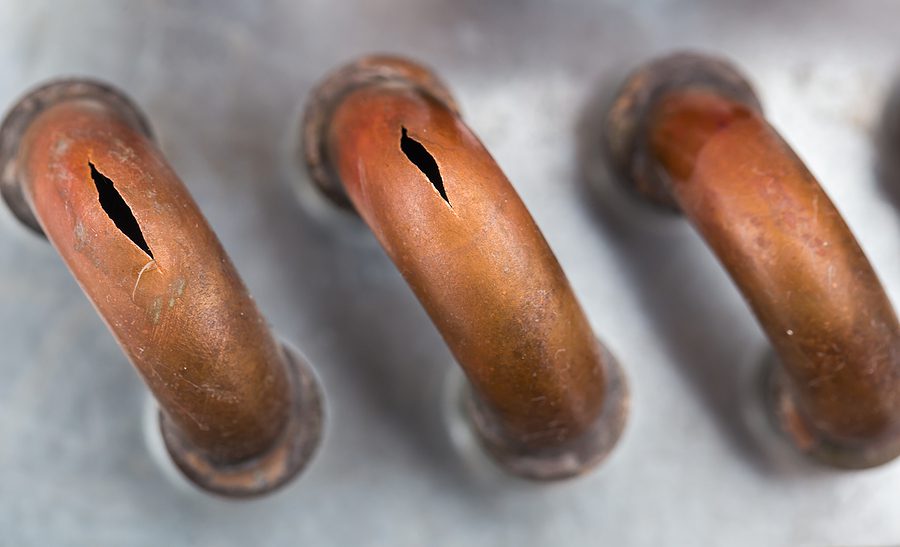No one wants to deal with the repairs, costs, and messes caused from burst pipes in their home or business.
So what makes these pipes burst in the winter?

The short answer is that the water entering your house from outside is much colder than it was over the summer months.
This cold water causes your pipes to shrink and in weaker parts will cause the pipe to burst. This is because the pipe can no longer withstand the water pressures inside.
What Causes Burst Pipes?
The pipe freezes when the temperature surrounding the pipe is lower than 20 degrees. Water can’t be that cold without freezing and expanding, and that makes your pipes more prone to bursting because of the added pressure.
That makes unheated spaces more susceptible — basements, attics and garages, for example. But even pipes under your cabinets can freeze and burst, particularly if they are on an exterior wall!
The good news is, your pipes may already be ready for the cold temps. It all depends on how extreme the weather is, the age of your home, the age of your pipes and what other upgrades you’ve done.
Our hope is that no matter your situation we can be of some help.
How To Avoid Burst Pipes
Here are our 8 tips to avoid burst pipes:
#1 Disconnect Your Garden Hoses Outside
As you are preparing your home for winter, spend a few extra minutes fully draining and disconnecting all exterior hoses. Any water left in your hose can then freeze and expand, causing a break at the point where your hose connects to the pipes leading into your house.
#2 DIY Insulate Your Pipes
Items such as pipe insulation or heat tape can keep your pipes warm on the coldest nights of winter. Foam insulation is available at your local hardware store, and you can cut it with a utility knife and wrap it around your pipes. For a more high-tech solution, you might consider heat tape. But that sort of thing can be complicated, so contact us first.
#3 Don’t Leave Your Garage Doors Open
If you have any supply lines in there, it’s even more important to keep your garage doors closed. “Also, keep a close eye on the pipes in the garage. If your water heater is located in your garage (as many are) then you need to insulate the area around it.
#4 Keep Your Faucets Running
During cold weather, always let one or two faucets drip cold water. The water flowing through your pipes will stop the lines from freezing and bursting. Letting even a tiny trickle flow is unlikely to send your water bill soaring, and is certainly less expensive than the cost of remedying a water leak when the pipe bursts.
#5 Leave The Doors To Your Cabinets Ajar
And, since freezing temperatures are the main culprit of busted pipes, you might consider your indoor under-the-counter lines safe. But not as much warm air gets there as you might expect! Keep your cabinet doors open to direct warmer air to your pipes. And be sure to take out any toxic cleaning supplies from under the sinks. A trip to the ER is not the holiday activity your family needs!
#6 Look Out For Leaks
Inspect your pipes for trouble spots. Check for loose connections, leaks, cracks, anything that puts the line at risk. It is also the ideal moment to patch any leaks that let cold air into your home. Inspect your electrical wiring, dryer vents, pipes and all doors and windows. But even the smallest crack can let in enough cold air to freeze your pipes.
#7 Keep That Furnace Or Heater Running
A slight increase in your heating bills doesn’t cost as much as a burst pipe. Make sure you keep the thermostat set above 55 degrees even when you’re not home. Your pipes will thank you.
We typically advise against relying on space heaters, but placing one can help direct some extra heat at pipes under sinks and in the colder parts of your home. Ensure they are not left running for long periods, monitored when in use and keep them away from flammable materials and fire hazards.
#8 Consider Your Pipes in Your Vacation Planning
If you’re headed out of town for the holidays, you’ll want to make sure to turn off the water to your house at the main valve.
Which means your pipes are far less likely to freeze and burst without water to fill them!
What to Do if Your Pipes Burst in the Winter
If so, and you are experiencing this unfortunate situation of a busted pipe in your home that is leaking water into your home, it is now imperative that you do the following.
To avoid water continuing to flow into your home at a rapid rate, you must turn off the water main to your home.
For most residential homes in suburbia, the water shut off heads to end of your sewer, close to the street.

